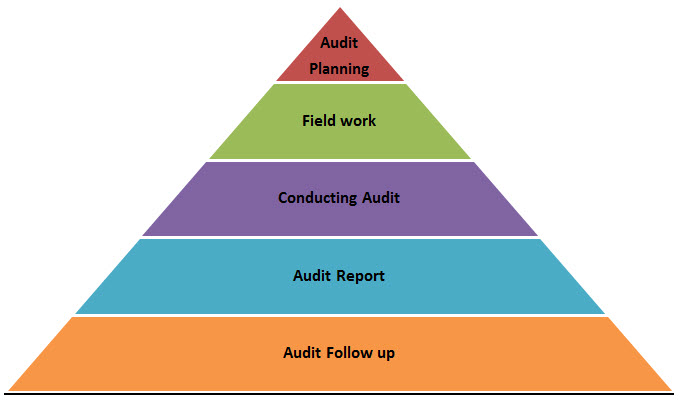Updated June 27, 2023

Difference Between Internal Audit vs External Audit
An audit is the independent examination and evaluation of the various books of accounts or financial statements, or reports of an organization or individual to ensure that they are accurate and in the manner as per applicable laws and regulations. There are two types of audits: internal audit and external audit. The Financial Report includes the balance sheet, income statement, cash flow statement, etc. The purpose of an audit is to review whether the information presented in a financial report matches an organization’s financial position at a given date or not. The auditor reviews the organization’s financial report per the auditing standard set by the government body.
In the tax, world audit is referred to the review of a taxpayer’s tax return for accuracy. Auditors predict the future of an organization by analyzing the past accounting period. An auditor does not judge what will happen in the future. They can predict and provide suggestions to the organization. The main purpose of an audit is to form an opinion on the information in a financial report.
An Auditor should comply with codes of ethics and conduct an audit by the international standard on auditing or laws and regulations set up by the government body. Some of the important auditing principles as listed below in the diagram.
General Audit is divided into two types based on an object –
- Internal Audit
- External Audit
Let’s discuss these two types in detail.
Internal Audit
Internal Audit examines the effectiveness of an organization’s internal controls, which is the accounting process. Internal auditors work for the organization as an internal employees. An objective of the internal auditor is to add value, improve organizational operations, and ensure that an organization complies with laws and regulations set by the government. Generally, internal auditors collect all required information on how the organization operates and use that information to show where it is doing well and where it can improve.
The purpose of an internal audit is to evaluate an organization’s performance periodically and identify the loopholes to improve in the future, which keeps the company big or small. Planned internal audits are important for organizations in a wide range of industries.
Responsibility of Internal Auditor
- Organization internal audits occur daily, weekly, monthly, quarterly, or annually. Some of the departments do internal audits more frequently than others.
- Monitoring, analyzing, and finding the risk and control of the organization.
- Report findings and recommendations to the organization board, manager, and other members.
- An internal auditor is a trusted consultant for an organization, and he is responsible for advising management on how to best manage the company’s risks and goals.
- An internal auditor is responsible for promoting ethics and helping to identify improper conduct.
- The most important job of the internal auditor is the ability to perform an impartial evaluation.
- An internal auditor is responsible for detecting fraud and errors and controlling them.
External Audit
The external audit is an independent evolution of the financial statements prepared by an organization. An outside organization, an independent person, performs the external audit. An external audit provides both business and government with a valuable check of organizational accounting. In an external audit, a conflict of interest is less likely than an internal audit. External auditor plays a critical role in validating an organization’s finances.
The purpose of an external audit is to review the company accounts to show that they are accurate and complete. Sometimes the organization hires an external auditor to investigate fraud.
Responsibilities of External Auditor
- The external auditor is responsible for providing an independent opinion on the organization’s financial statements.
- Its job is to understand the organization’s work environment, operations, and internal controls.
- Its main objective is to serve the organization’s shareholders by providing an opinion about the soundness of the financial reports prepared by the organization.
- Certifying the financial statement is the main job of an external auditor.
- Determining the real organization’s market and financial situation helps further managerial decisions.
The below diagram shows the general audit procedure which the auditor or organization follows during the audit.
Head To Head Comparison Between Internal Audit vs External Audit (Infographics)
Below is the top 7 difference between Internal Audit vs External Audit
Key Differences Between Internal Audit vs External Audit
Both Internal Audit vs External Audit are popular market choices; let us discuss some of the major Differences
- An internal audit is a regular, continuous activity that an internal audit department of an organization performs. The external audit is a yearly activity to investigate the organization’s financial statement by a third party.
- Internal audit is not compulsory, whereas External audit is compulsory.
- The organization decides the scope of an internal audit, whereas the external audit scope is decided by law.
- Internal auditors are employees of the organization, whereas external auditors are always independent bodies of the organization.
- The objectives of Internal and external audits are different; an objective of the internal audit is to educate management and employees about how to improve business and efficiency. In contrast, the objective of an external audit is to investigate and give credibility to financial reports that go to shareholders.
- An internal audit report is submitted to the organization’s internal management, whereas an external audit is reported to shareholders, Government, Creditors, Suppliers, etc.
Internal Audit vs External Audit Comparison Table
Below is the 7 topmost comparison between Internal Audit vs External Audit
| Basis Of comparison between |
Internal Audit |
External Audit |
| Meaning | It is an ongoing audit function performed by an internal auditing team. | It is an audit function that an independent firm performs. |
| Conducted By | The internal auditor is usually from inside the organization and its employee and is appointed by Management. | The external auditor is from outside the organization (Third Party), and its shareholder appoints it. |
| Reports | Management | Shareholders |
| Audit Period | Continuous process | Once a year |
| Purpose | To evolute the routine activities and provide control for the improvement. | To Investigate and verify the financial statement of the organization. |
| Legally Bound | No, an internal audit is not compulsory. | The external audit is compulsory or legally bonded as per the government act. |
| Range | The management of the organization decides the range of internal audits. | A range of external audits is decided by a government body or per rules and regulations. |
Conclusion
So, by and large, both Internal Audit vs External Audit is important for every organization to assess the overall work. Internal and External audit plays a vital role in the organization’s effectiveness and gives a true and fair view of the organization’s financial statement. The role of the external auditor is very important and critical as it certifies the integrity of the organization’s financial statement. The external auditor checks the work of the internal auditor as a part of the process so that they can reassure the reliability of internal control for an organization.
Internal auditors are salaried employees of the organization and are considered to be independent, whereas external auditors are an independent body that carries out the audit for the organization. In short, we can say that internal and external audits are not opposite to each other; instead, they supplement each other.
Recommended Article
This has been a guide to the top difference between Internal Audit vs External Audit. Here we also discuss the Internal Audit vs External Audit key differences with infographics and a comparison table. You may also have a look at the following articles to learn more:




